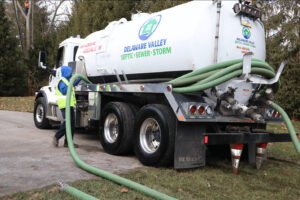A septic tank comes with many benefits, including not needing to worry about the state of your local sewer system. However, septic systems require one recurring expense that you might be uncertain about: getting the tank pumped. A smart course of action is to plan to have a sewer and drain cleaning professional visit your residence in Montgomery, Chester, or Delaware Counties to have your septic tank pumped.
Why Do I Need to Pump My Septic Tank?
Your septic tank represents a system that maintains a delicate balance that keeps the water waste from your home from leaking into the surrounding environment. Over time, a layer of sludge and solid waste forms in your tank. The presence of bacteria in your tank is supposed to help break those solids down, so they do not cause additional problems.
Shouldn’t The Bacteria Handle the Sludge Buildup?
You might be wondering, “doesn’t the septic tank have bacteria to break down anything that would need pumping?” While bacteria are in your septic system to help control sludge, the amount of sludge that builds up tends to be more than the bacteria can handle. If left unchecked, not pumping your septic tank can lead to:

Blockages
Blockages are among the most common complications that can occur when you don’t pump your septic tank. As the sludge and sediment build up in your system, it can obstruct the pipes that carry wastewater from your home to your drainfield. Once this happens, you’ll begin to see slower drainage from your home’s water system and can potentially see things like:
- Greener grass above the drainage field.
- Swampy areas around the drainage system.
- Wastewater backing up in your home’s drains.
Along with these visual signs, you’ll also begin smelling signs of trouble. You’ll start to smell the raw sewage that doesn’t have anywhere else to go. This smell will be hard to miss, as it will often hang over your drainage field and find its way into your home if left untreated.
Disease
Septic systems are usually straightforward to maintain, but since they are sewage treatment systems, they can present a real health risk if not cared for properly. When the septic system isn’t pumped and blockages begin to develop, raw sewage can start to seep into the ground around it. If the soil becomes saturated enough, the waste can reach the surface and come into contact with your family, potentially causing innumerable diseases in the process. Following a regular pumping and maintenance routine can help you prevent the potential for diseases from spreading.
Damage
In addition to creating a breeding ground for disease, a blocked septic system can lead to the system as a whole failing irreversibly. If caught in time, a single blockage isn’t likely to damage the system beyond repair, but consistently failing to maintain the septic system can compound the stress the system is under. Eventually, the damage can require that a new system be installed.
How Often Should I Pump My Septic Tank?
Now that you know the reasons why you should regularly pump your septic tank, the next question becomes how often you should. The general recommendation is every one to three years, but you should also take into account how many people live in your home.
Regularly pumping your septic tank is the best way to keep your home safe and healthy. For tips for maintaining your septic system, or to consult a septic replacement specialist serving Delaware County, Chester County, and Montgomery County, give the Delaware Valley Septic, Sewer, and Storm team a call today!




